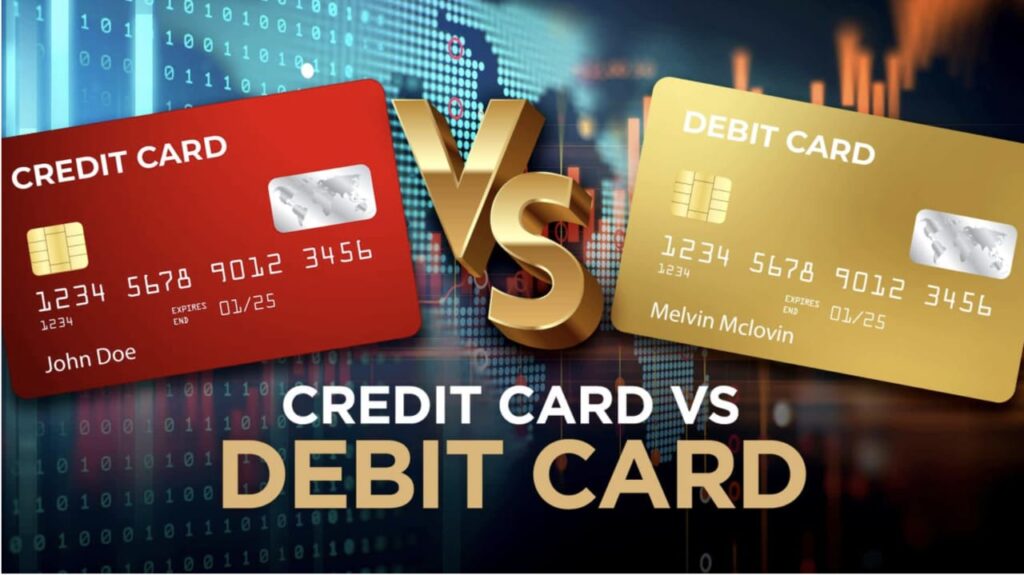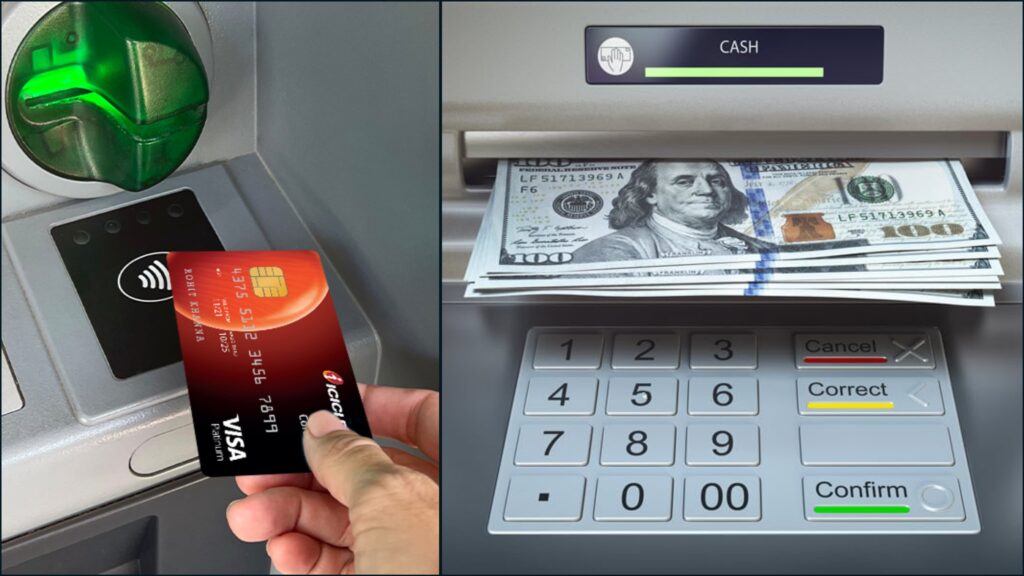In today’s cashless society, debit and credit cards have become essential tools for managing finances and making purchases. While both cards (Debit vs. Credit Card) may look similar and are widely accepted for transactions, they function differently and come with distinct benefits and drawbacks. Understanding these differences is crucial for making informed financial decisions.
This blog will delve into the key differences between debit and credit cards, helping you choose the right option for your needs.
The Ultimate Guide to Debit vs. Credit Card

In today’s digital world, plastic reigns supreme. But with a plethora of debit and credit cards vying for your wallet space, choosing the right one can feel overwhelming. Fear not, financially savvy friend! This comprehensive guide will unveil the key differences between debit and credit cards, empowering you to make informed decisions and master your plastic fantastic.
1. Source of Funds
The primary difference between a debit card and a credit card lies in how the funds are sourced:
Debit Card: When you use a debit card, the money is directly withdrawn from your checking account. This means you can only spend the amount you have available in your account, preventing you from accumulating debt.
Credit Card: A credit card, on the other hand, allows you to borrow money from the card issuer up to a certain limit. You will then need to pay back the borrowed amount, either in full or in installments, typically with interest if not paid off within a grace period.
2. Impact on Credit Score
Using debit and credit cards can affect your credit score differently:
Debit Card: Transactions made with a debit card do not impact your credit score since they are not reported to credit bureaus. This makes debit cards a non-factor in building or affecting your credit history.
Credit Card: Credit card usage is reported to credit bureaus, and responsible use (such as making timely payments and maintaining a low balance relative to your credit limit) can help build and improve your credit score. Conversely, (Debit vs. Credit Card) late payments or high credit utilization can negatively impact your score.
3. Interest and Fees
Another significant difference between debit and credit cards is the cost associated with using them:
Debit Card: There are typically no interest charges on debit card transactions since you’re using your own money. However, some accounts may charge fees for certain transactions, such as ATM withdrawals from out-of-network machines or foreign transactions.
Credit Card: Credit cards can incur various fees and interest charges. If you carry a balance from month to month, you will be charged interest on the outstanding amount. (Debit vs. Credit Card) Additionally, there can be annual fees, late payment fees, balance transfer fees, and cash advance fees, depending on the card’s terms.
4. Fraud Protection

Both debit and credit cards offer fraud protection, but the level and type of protection can vary:
Debit Card: Fraud protection for debit cards can be limited compared to credit cards. If unauthorized transactions are reported promptly, most banks will cover the losses, but the timeline and amount covered can vary. Additionally, because the funds are taken directly from your account, it may take time to get your money back, which can impact your immediate financial situation.
Credit Card: Credit cards generally offer stronger fraud protection. Under the Fair Credit Billing Act (FCBA), your liability for unauthorized charges is capped at $50, and many card issuers offer zero liability policies. Additionally, since you’re not using your own money, fraudulent charges do not immediately impact your bank balance.
5. Rewards and Benefits
Credit and debit cards can offer different incentives and benefits:
Debit Card: Rewards programs for debit cards are less common but do exist. Some banks offer cashback, discounts, (Debit vs. Credit Card) or points for using their debit cards, although these programs are typically less generous than those for credit cards.
Credit Card: Credit cards often come with extensive rewards programs, offering cashback, points, or miles for every dollar spent. Additionally, many credit cards offer perks such as travel insurance, purchase protection, extended warranties, and access to exclusive events.
6. Spending Control
Your ability to control spending can be influenced by whether you use a debit or credit card:
Debit Card: Debit cards can help you stick to your budget since you can only spend what you have in your account. This can be particularly useful for those who struggle with overspending or managing debt.
Credit Card: Credit cards provide more flexibility by allowing you to spend beyond your immediate cash reserves, (Debit vs. Credit Card) but this can also lead to overspending and debt accumulation if not managed carefully.
7. Application and Approval
The process for obtaining a debit card versus a credit card also differs:
Debit Card: Getting a debit card is relatively straightforward. Once you open a checking account with a bank or credit union, you are usually issued a debit card without the need for a credit check.
Credit Card: Applying for a credit card involves a more rigorous process. Lenders will check your credit history and score to determine your creditworthiness. (Debit vs. Credit Card) Approval and the credit limit assigned depend on factors such as your income, existing debt, and credit history.
Can I Use My Debit Card as a Credit Card?
Many people wonder if they can use their debit card like a credit card, and the answer is yes, to some extent. When you choose to use your debit card for a purchase, you often have the option to select “credit” at the point of sale. (Debit vs. Credit Card) This doesn’t turn your debit card into a true credit card, but it does mean that the transaction will be processed through the credit card network (Visa or Mastercard, for example) instead of the debit network.
This can offer additional protections and may be necessary for certain types of transactions, like reserving a hotel room or renting a car. However, the funds still come directly out of your checking account, so you must have enough money available to cover the purchase.
Apply for the world’s best credit card
Is It Better to Have a Debit Card or Credit Card?

The choice between a debit card and a credit card depends on your financial situation, spending habits, and personal preferences.
Debit Card: If you prefer to avoid debt and interest charges, a debit card is a good choice. It helps you stick to your budget since you can only spend what you have in your account, making it easier to control spending. Debit cards are also easier to obtain and typically come with lower fees.
Credit Card: Credit cards offer significant advantages, such as the ability to build your credit score, earn rewards, and benefit from enhanced fraud protection. They also provide greater financial flexibility by allowing you to spread out payments for larger purchases. However, they require disciplined use to avoid high-interest debt and potential fees.
For many, a balanced approach works best. Using a debit card for everyday expenses and a credit card for larger purchases, travel, or online shopping can provide a mix of financial control, rewards, and credit-building opportunities. (Debit vs. Credit Card) Ultimately, the best choice depends on how well you manage your finances and the specific benefits you seek.
Is a Living Trust the Key to Smooth Inheritance Planning?
Which card is better, Mastercard or Visa?
While this blog focuses on the core differences between debit and credit cards, here’s a quick segment you can include to address Mastercard vs. Visa:
Both Mastercard and Visa are giant payment processors, the networks behind many debit and credit cards. You might wonder which brand reigns supreme. The truth is, for most consumers, the distinction between Mastercard and Visa is relatively minor. Both offer widespread acceptance at millions of merchants globally.
Here’s a breakdown of some factors to consider:
Merchant Acceptance: Both Mastercard and Visa enjoy near-universal acceptance, so you’re unlikely to encounter issues regardless of the brand.
Specific Card Benefits: The rewards programs, perks, and benefits offered depend on the individual card you choose, not the network itself (Visa or Mastercard).
Certain Niche Cases: In some rare instances, a specific merchant or travel agency might have a preferred network offering exclusive benefits or slightly lower fees.
Ultimately, the choice between Mastercard and Visa boils down to personal preference and any potential benefits offered by a specific card within that network. Focus on finding a card with rewards programs, fees, and features that align with your spending habits, and don’t get too hung up on the network itself.
Alos Read: Bitcoin Surges to $71000
Conclusion
Both debit and credit cards offer unique advantages and potential drawbacks. Debit cards provide a straightforward way to manage spending without the risk of debt, making them ideal for everyday transactions and budgeting. Credit cards,(Debit vs. Credit Card) however, offer the opportunity to build credit, earn rewards, and benefit from stronger fraud protection, but require disciplined use to avoid financial pitfalls.
Ultimately, the choice between a debit card and a credit card depends on your financial habits, goals, and the benefits you value most. For many, a combination of both can provide the best of both worlds, allowing you to manage your finances effectively while taking advantage of the perks each type of card offers.
